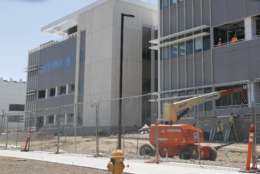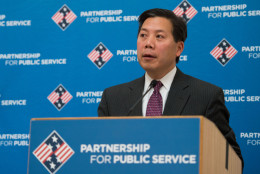Leasing/Property Management
-
Emily Murphy, the nominee to be the next administrator of the General Services Administration, received broad support from both sides of the aisle.
October 18, 2017 -
House Veterans Affairs Committee Chairman Phil Roe (R-Tenn.) said the legislation he recently introduced that sets up a BRAC-style commission to review medical facilities at the Veterans Affairs Department marks the beginning of a long conversation on the topic.
October 13, 2017 -
The president might call it "reorganization." Veterans Affairs Secretary David Shulkin might call it "modernization." But the general principles are the same.
September 19, 2017 -
GSA's Dan Mathews pledged during his Aug. 3 swearing in ceremony to meet federal real estate needs with taxpayers' best interests in mind.
August 03, 2017 -
The $1.6 billion project was cancelled in mid-July, but officials say they are committed to coming up with a plan for FBI's headquarters by the end of 2017.
August 02, 2017 -
The House passed a last-minute bill Friday morning that will replenish the Veterans Choice Program with $2.1 billion in additional funds for the next six months. The additional Choice funds are crucial, as they buy lawmakers and the Veterans Affairs Department more time to redesign the program. But the legislation is also packed with new hiring flexibilities.
July 28, 2017 -
Chris Lu, former deputy secretary for Labor, says the department also had its search for new headquarters canceled. And Dan Tangherlini, former General Services Administration administrator, said a discussion about federal capital investments needs to be had.
July 18, 2017 -
The Veterans Affairs Department spends too much money on bricks and mortar and not enough on its own doctors and nurses, former VA Secretary Anthony Principi told Congress. Some lawmakers are once again calling for a full review of VA capital assets, which span encompass more than 6,000 owned buildings and 1,500 leased facilities and span more than 170 million square feet.
July 14, 2017 -
Officials in two states and the District of Columbia are scratching their heads over how the new FBI headquarters project, after 10 years of planning, could fall through. But construction officials at the General Services Administration felt they had no other choice once Congress failed to come through with enough money to proceed. Former GSA Administrator Dan Tangherlini joins Federal Drive with Tom Temin to discuss the long-term implications.
July 13, 2017 -
The FBI joins a growing list of agencies that thought they were going to escape crumbling, obsolete buildings. A deal to trade its downtown headquarters to a developer and move to Maryland or Virginia is dead for now. Chris Lu knows what that feels like. As former deputy secretary of Labor, he was involved in a potential swap of the aging Perkins Building that also fell through. He shares his insight on Federal Drive with Tom Temin.
July 12, 2017 -
The House Appropriations Financial Services and General Government Subcommittee stayed quiet on federal pay in its 2018 bill. Without action from Congress, federal civilian employees would receive a 1.9 percent raise next fiscal year. The appropriations bill also includes significant spending cuts to key priorities at the General Services Administration and Office of Personnel Management.
June 29, 2017 -
The Veterans Affairs Department will immediately get rid of 71 vacant or nearly empty facilities. VA will eliminate another 71 buildings within the next six months. It's part of the department's long term effort to trim its inventory of outdated, underutilized or vacant buildings within the next two years.
June 21, 2017 -
While much of the recent attention has fallen on the president’s proposed budget, Congress has still been introducing and passing legislation. Here are a few bills worth knowing about that might have slipped through the cracks.
June 02, 2017 -
House Appropriations Subcommittee members asked Tim Horne, the acting administrator of the General Services Administration, to better explain the agency’s 2018 budget request, particularly for the FBI headquarters and disposal of underutilized federal property.
May 24, 2017 -
VA's facilities planning processes leave it with millions of square feet of empty and decaying space.
May 09, 2017















